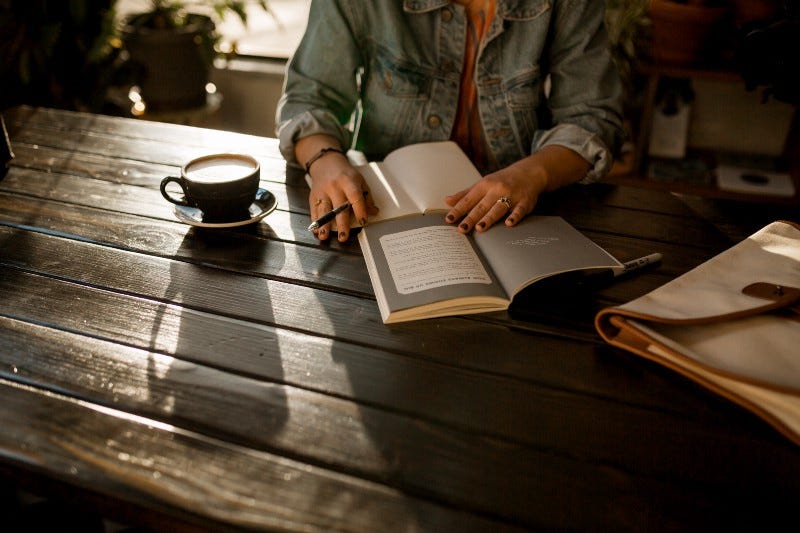The Story Writer’s Path
Use these suggestions for reading in 2020

A few years ago, I had a client who was writing a memoir about a family tragedy. She was a pretty good writer, and the story was compelling. At our coaching sessions, I’d recommend book titles to her — memoirs in the same vein, writing craft books and so on. Only after we’d worked together for a year or so did she admit to me that she never read. “I just watch movies,” she said.
I was stunned. And I never would have taken her on as a client if I’d known she wasn’t a reader. (My bad for not asking her up front.) I’ve got nothing against watching movies, but it is a totally different process in your brain than reading.
Writers need to read
If you want to be a writer, you must read. Here’s what Stephen King says about reading and writing:
“If you want to be a writer, you must do two things above all others: read a lot and write a lot..reading is the creative center of a writer’s life…you cannot hope to sweep someone else away by the force of your writing until it has been done to you.”
MFA programs teach the art of reading as a writer through assigning essays that allow students to mine books for elements of craft. The certificate-in-writing program where I teach follows this format as well. Because if you don’t happen to have a coach or mentor to teach you writing handy, books can fill the need nicely.
Reading a lot allows writers to inhale and internalize the rhythms and tropes of story. Reading as a writer allows you to study the way others have done it, to get it into your brain so that the words can then flow onto the page. Sometimes when I’m heavily into working on a novel, I feel the urge to read everything I can get my hands on. Words in, words out. I need to store the words inside me in order to have enough to dispense out.
“Every time we enter a text as a reader, we receive a writing lesson: how to spell, punctuate, use proper grammar, structure a sentence or paragraph, and organize a text. We also learn the many purposes writing serves and the different genres and formats it assumes to serve these varied purposes.” — Scholastic
What writers should read
What follows are some ideas for the best areas in which to read as a writer.
Your genre
Read widely in the genre in which you choose to write. If you’re a novelist, read novels. If you’re longing to write a memoir, read memoirs. More specifically, read mysteries, romances or thrillers, depending on your writing desires. The only way to know what’s happening in your genre is to read in it.
Craft books
Read books about writing. There are so many available — some excellent, some not so great. Books on writing craft help you grasp concepts you may have seen executed as you read in your genre. They can be helpful in figuring out the how of writing. As a starting point, I recommend The Writer’s Journey by Christopher Vogler, The Art of Character and The Compass of Character by David Corbett, and Bird by Bird by Anne Lamott. Many writers of all levels are big fans of On Writing by Stephen King. Writing the Breakout Novel by Donald Maas is good, the workbook that accompanies it even moreso. Do a search on Google or Amazon to find more. There are many great titles on specific areas of writing, such as Hallie Ephron’s, Writing and Selling Your Mystery Novel.
Between reading books in your genre and reading craft books, you can learn a ton. The wonderful thing about writing is that there’s always something else to learn about it — and yet another book to read.
Productivity and self-help
And then there’s the pesky mindset piece of becoming a writer. So many of us struggle with lack of confidence, fear of sitting down to the page, terrible procrastination. Learning to master your habits so that you can write regularly is as important as studying craft — because if you aren’t writing regularly all that knowledge of craft means nothing. Productivity and self-help books are huge categories whose authors regularly hit the best-seller lists. (Apparently writers aren’t the only ones who struggle with mindset.) Authors like Jen Sincero offer You Are a Badass, Marie Forleo gives us Everything is Figureoutable, and Rachel Hollis has her popular Girl series — Girl, Wash Your Face, and Girl, Stop Apologizing.
These books may seem trite but they are popular for a reason — because they offer timeless truths about getting your head on straight and your attitude tuned up. If you don’t mind less up-to-date language and old examples you can also read the classics like The Magic of Believing by Claude M. Bristol, Think and Grow Rich by Napoleon Hill, and Psycho-Cybernetics by Maxwell Maltz.
Esoteric
I’m a seeker, always into the woo. I love books on spirituality and also topics like astrology, tarot and my current favorite, the Enneagram. Astrology and the Enneagram are personality systems that also have a spiritual element. But even if the word spiritual gives you the hives, these topics can be of use on a more practical level. On one hand, they can help you to understand yourself (and awareness is half the battle) and also, bonus points, your characters. Besides, they’re a lot of fun.
These are the categories which my reading for writing tends to encompass. What do you read? And how do you read as a writer? I’d love suggestions for best writing craft books, too.



